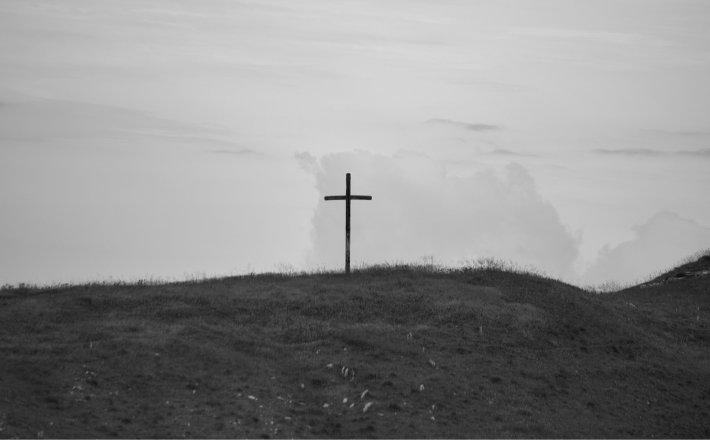Commentary on Psalm 22
Psalm 22 is a song-prayer about cognitive dissonance, unmet expectations, and the disorientation that can come from trusting a caring God while living in a world full of suffering.
An overview of Psalm 22
The superscription of Psalm 22 identifies it as “A Psalm of David”—a label referring to the collection to which the psalm belongs rather than to its authorship—and includes what might be a reference to the musical tune worshipers would use when singing the psalm: “according to The Deer of the Dawn.” While we don’t know exactly how the ancient Israelites used the psalms in their worship, this superscription suggests that singing was part of it and can serve as a reminder to us that the words that follow were embraced as part of faithful, corporate worship.
Psalm 22 is an individual lament psalm. Like most laments, Psalm 22 includes cries to God by name, descriptions of the psalmist’s current situation, requests for help and reasons that God should help the psalmist, and statements either celebrating that these calls for help have been answered or anticipating that they will be answered. In Psalm 22, these elements generally fall into two main parts:
- verses 1–21a Plea for help
- verses 21b–31 Praise for help received
In the Hebrew, the language of the psalm underscores this two-part division. In verse 2, the psalmist laments that God does not “answer,” while in verse 21b, the psalmist declares that God has finally “answered.” Many translations, including the New Revised Standard Version (and the New Revised Standard Version Updated Edition), render this word as “rescued” rather than the more literal “answered.” The point, however, is that the psalm represents actual dialogue with a God who listens and responds—with both word and deed, statement and action. We cry out, and God answers.
The crux of Psalm 22, however, is that God does not always answer immediately or in ways that seem obvious. In verses 1–5, the psalmist contrasts her current experience of forsakenness with her ancestors’ experience of deliverance.1 Why did they receive divine help but she does not? It doesn’t make sense, and it hurts. In verses 6–18, she expands on these hurts in graphic, emotive language. She describes social ostracization and bullying, she describes physical attacks, and she describes how her body feels in response to all of this.
Notably, the psalmist seems to hold God—not just her human enemies—culpable for her suffering: her recollection of God’s importance in her life since her birth is an indirect accusation of the God who has kept her safe before but is not doing so now (verses 9–11). The human enemies may be the ones who surround her, mock her, and bind her, but it is God who she says is laying her down in death (verse 15b). Rendering the disorientation of this experience even more poignant is that the image in verses 9–10 is of God as a midwife who delivers babies (verse 9) and as a mother or wetnurse who cares for them (verse 10). How, the psalmist cries, can a God who cared for me so intimately now abandon me?!
In the middle of verse 21 and with no explanation of when or how change has come, the psalmist switches to praise of the God who has not abandoned her. The communal dimension of this psalm is on full display as she vows to tell the story of this divine deliverance to those in the congregation in order to inspire and instruct them in their worship (verses 22–24, 30–31). The psalmist’s story—including her raw and even accusatory lament—becomes the means by which others can “remember and turn to the LORD” (verse 27). Even those who, like the psalmist, feel as though God has laid them down in death will come to worship and live for God (verse 29).
Reading into Psalm 22
The superscription of Psalm 22 categorizes this prayer as part of the Davidic collection. While being part of the Davidic collection does not necessarily mean that David wrote the psalm, the association indicates that some of the earliest interpreters of the psalm in some way connected its theological perspective with David’s experiences.
Later Jewish tradition often associates this psalm with Esther. The biblical book that bears her name contains no references to God nor any explicit mention of prayer, but the implication of the story is that, confronted with Haman’s plans to commit genocide, she spends time in fasting—and prayer—as she prepares to take action on behalf of her people. She is the one who cries out “My God, my God, why have you forsaken me?” She is the one who remembers how God has delivered Israel from genocide and exile in the past and wonders why it seems like God is letting such violent acts occur now. And ultimately, she is the one who celebrates the fact that God does finally deliver once more.
The Christian tradition, of course, strongly associates Psalm 22 with Jesus. The psalmist’s description of the crisis maps easily onto the narrative of Jesus’ passion: Jesus is mocked (verses 6–7), his physical suffering is extreme (verses 14–15), he is bound (verse 16), and his clothes are divided according to lot (verse 18; see Matthew 27:45). Furthermore, both Matthew’s and Mark’s accounts of Jesus’ crucifixion report that at about three o’clock, Jesus cried out loudly the first verse of this psalm (Matthew 27:46; Mark 15:34).
Important to emphasize from the pulpit is that Jesus’ quotation of this psalm does not mean that God had actually forsaken him on the cross. The Father did not turn his face away from the Son on the cross. Even before the theological issues that arise if we say that one Person of the Trinity abandoned another, quoting verse 1 of Psalm 22 implies reference to the whole of the psalm—a psalm that ultimately declares God’s faithful presence no matter what the psalmist feels in the moment.
The fact that we can so easily associate Psalm 22 with Esther, Jesus, or other biblical characters such as Jeremiah or David points to the fact that the emotions it articulates are extremely common. As we hear this psalm again on Good Friday—and on any other day—we are also invited to locate our own experiences within the psalmist’s story. We, too, may feel forsaken and need to cry out loudly about this feeling. We, too, can take comfort in the reminder of God’s presence, protection, and provision even in the midst of feeling abandoned: God “did not hide his face from me, but heard when I cried to him” (verse 24b).
Notes
- I am using feminine pronouns as I read this psalm because I am reading—and identifying with it—as a woman. Historically, the psalm’s author was almost certainly a man.


March 29, 2024